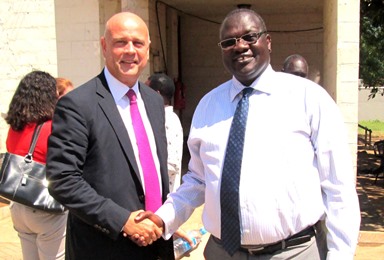Machar and IRI VP discuss importance of building democracy in South Sudan
October 19, 2013 (JUBA) – South Sudan’s former vice-president, Riek Machar Teny, said the country is badly in need of democratic political environment in order to hold together its society of multiplicity.

Machar made the remarks on Saturday in a meeting with the visiting vice-president of the US-based International Republican Institute (IRI), Thomas Garrett, during which the two leaders discussed the importance of encouraging and supporting democratic political processes in the country.
IRI advances freedom and democracy worldwide by developing political parties, civic institutions, open elections, democratic governance and the rule of law.
The IRI senior official came to South Sudan to acquaint himself with the political processes in the country as well as witness the organization’s activities in supporting the capacities of political parties and leaders in building democracy.
Machar’s press secretary James Gatdet Dak told Sudan Tribune that the meeting, held at the residence of the former vice-president, discussed a wide range of issues that are important to the nurturing of a foundation for a democracy in the new country.
They also touched on the need for freedom of political parties to carry out their peaceful democratic activities as well as the importance of levelling the playing field for all the country’s over 23 political parties as the nation moves toward general elections in 2015.
Machar, also the deputy chairperson of the ruling Sudan People’s Liberation Movement (SPLM), while commending IRI’s current program, called on the organization to double its efforts by committing more resources to ensure success of democratic political processes.
“We are in a battle of trying to see to it that this country becomes a democracy,” he told the IRI’s second top leader, adding that there was a lot to be done to realize the commitment of the ruling SPLM party.
Security organs, he pointed out, should remain neutral in the current political wrangling; adding that censorship of statements coming from some individual leaders in the public media should not be encouraged.
The party leader said concerned that some directives have been issued to the public media, particularly the state-run South Sudan TV and radio, not to broadcast statements and activities of some figures, including ruling party leaders.
He further pointed out that lack of democracy can push the people to the extreme, warning that the South Sudanese society is historically prone to violence as an alternative means of expression and needed to be handled with care.
The people of South Sudan fought successive regimes in the former Sudan, accusing them of dictatorship, colonization and violation of their rights to freedom and development, leading to the split into two countries on 9 July 2011.
Machar is set to contest for the party’s top position against the current SPLM chairperson, Salva Kiir Mayardit, who is also the sitting president of the government, and vowed to democratically unseat Kiir by 2015.
(ST)
